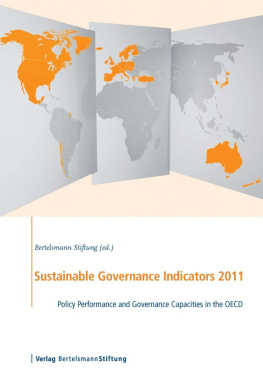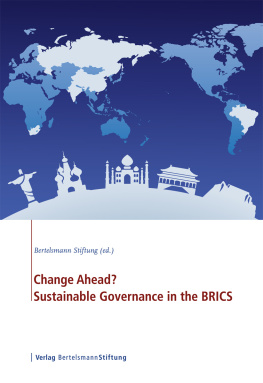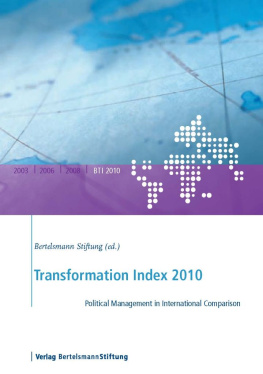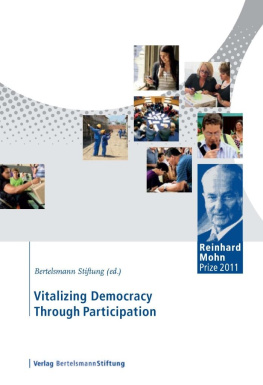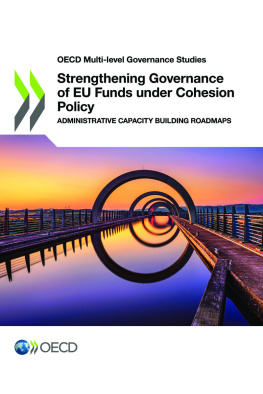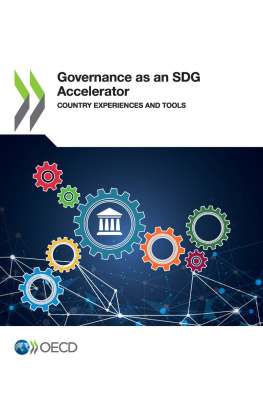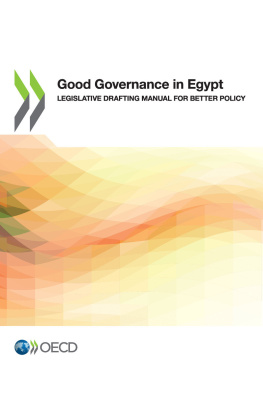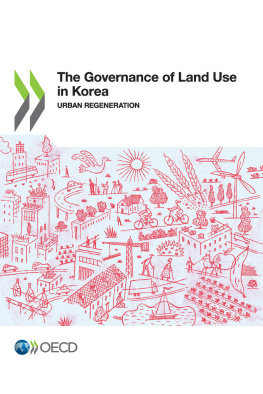Bibliographic information published by the Deutsche Nationalbibliothek
The Deutsche Nationalbibliothek lists this publication in the
Deutsche Nationalbibliografie; detailed bibliographic data
is available on the Internet at http://dnb.d-nb.de.
2011 E-Book-Ausgabe (EPUB)
2011 Verlag Bertelsmann Stiftung, Gtersloh
Managing editors: Dr. Stefan Empter, Dr. Daniel Schraad-Tischler
Translation: Barbara Serfozo, Berlin
Production editor: Christiane Raffel
Cover design: Nadine Humann
Cover illustration: Andreas Recek, ardesign, Bielefeld
Typesetting and Printing: Hans Kock Buch- und Offsetdruck GmbH, Bielefeld
ISBN : 978-3-86793-394-0
www.bertelsmann-stiftung.org/publications
www.bertelsmann-stiftung.de/verlag
Table of Contents
Preface
The OECD world has been hard hit by the global economic and financial crisis. In 2009, many countries experienced their worst recession since the end of World War II, and many continue to struggle today with the severe aftereffects of crisis. The Sustainable Governance Indicators 2011 (SGI 2011) survey period stretches from the beginning of May 2008 to the end of April 2010, thus covering precisely the time in which governments were particularly challenged to react to the crisis quickly and resolutely. Yet the acute, short-term pressure of looming problems, as the crisis produced and continues to produce, must not lead to neglect of the fundamental need for sustainability. Indeed, policymakers must retain a focus on the long-term viability of sociopolitical, economic, and environmental systems in order to maximize the opportunities and quality of life afforded both to current and future generations.
Decisions on investment, consumption, conservation, and the exploitation of resources are not made by abstract generations but, rather, by quite specific individual and collective actors. In the sustainable creation and protection of citizens opportunities, government action plays an undeniably prominent role through concrete policies and steering activities in areas such as finance, education, health, family policy, pensions, the environment, and research and development.
It is with an eye to the issue of sustainable governance that the SGI 2011 allow the strengths and weaknesses of OECD states political and economic systems to be identified with considerable precision. This is true of countries crisis-related vulnerabilities and short-term crisis-management capabilities as well as of the capability to successfully meet critical future challenges. These include not only ongoing economic globalization, but also demographic change in the form of aging societies, migration trends, new security risks, and the increasing scarcity of resources. As broad drivers of policy-making, these various challenges can be broken down into specific issues and a variety of separate policy areas, in each of which weaknesses rather than optimum performances are often clearly evident. From this analysis of strengths and weaknesses emerges a clear picture of each countys reform needs.
OECD states reform needs are represented as a part of the SGI 2011s Status Index, which provides answers to two essential questions: First, how successfully do individual countries realize sustainable policy outcomes in the context of a socially responsible market economy? And, second, what is the quality of the countrys rule of law and democratic framework? For it is only in the context of a solid democratic order, which ensures truly equal opportunities for participation and a rigorous adherence to the rule of law, that sustainable policy outcomes can ultimately be achieved.
Alongside the question of reform needs is that of whether political systems have the fundamental capacity to implement critical reforms and political measures effectively. Answering this question is not a trivial task, as the formulation, passage, and implementation of reforms in modern democracies involve the participation of numerous actors. The SGI 2011 measure the reform capacity of the various OECD states through its Management Index, which seeks to do justice to the issues complexity through a broad set of individual indicators. The Management Index closely examines governments political steering capabilities as well as their interactions with other institutional and societal actorsparticularly citizens, legislatures, interest groups, and the mediathrough each phase of the policy cycle. In taking this broad perspective, the SGI project goes far beyond other comparable indices.
The overall approach of the Bertelsmann Stiftungs Sustainable Governance Indicators is driven by the premise that the higher a governments reform and policy-shaping capacity, the more likely its actions are to improve the countrys political, economic, and social state in the medium to long term with respect to the above-noted key issues, thus effectively addressing the countrys reform needs. This hypothesis should not be taken to imply that a reform-capable government always carries out the right reforms (whatever those may be) and thus achieves the best possible results. It simply suggests that reform needs should decline in countries whose governments demonstrate a strong capacity for reform, and vice versa. Only time will tell whether this holds true throughout the OECD member states.
The development of the SGI 2011 took place in part through a thorough internal and external evaluation of its 2009 pilot-edition predecessor. This led to various adjustments being made both in the survey process and in the index design itself, placing methodological limits on the ability to make direct comparisons between the SGI 2011 and the SGI 2009 results. However, in the course of the SGI 2011 survey, a process of interpolation was carried out for the adjusted indicator sets that was aimed at developing correspondingly adjusted values for the SGI 2009 survey period (January 2005 through March 2007). This has made possible a comparison between the recalculated SGI 2009 results and those of the newly released SGI 2011 (particularly through the projects website, found at www.sgi-network.org).
The 2011 edition of the SGI was also the first of the projects editions to incorporate new OECD member Chile, whichas the results showhad no need to fear comparison with many longtime OECD states. The Sustainable Governance Indicators 2013 will also evaluate Slovenia, Israel, and Estonia, which have joined the OECD in the interim, but could not be considered in this round.
More than 80 renowned experts from around the world participated in the SGI 2011s complex and multi-stage process of data collection and data review. As in the SGI 2009 pilot edition, the focus of interest lies not solely on quantitative data, but also on country experts detailed qualitative evaluations. The full conclusions of the SGI 2011 are thus not to be found in a single number or ranking but, rather, in the systematic comparative treatment of a variety of qualitative assessments, their transparent portrayal, and their comparison with other countries results. In order to provide this layer of added value on top of simply quantitative data, our SGI country experts have compiled extensive reports on each of the 31 surveyed OECD countries, working on the basis of a detailed, standardized codebook.
This publication is meant to serve as an introduction to the project as whole. The contributions presented here draw upon the vast body of data and knowledge collected and made available at www.sgi-network.org. The website not only provides users full access to all the data, assessments, and results; it also allows users to draw comparisons between countries at each level of assessment. The SGIs combined total of nearly 150 qualitative and quantitative indicators outline the sustainable policy performance in each OECD country surveyed.


